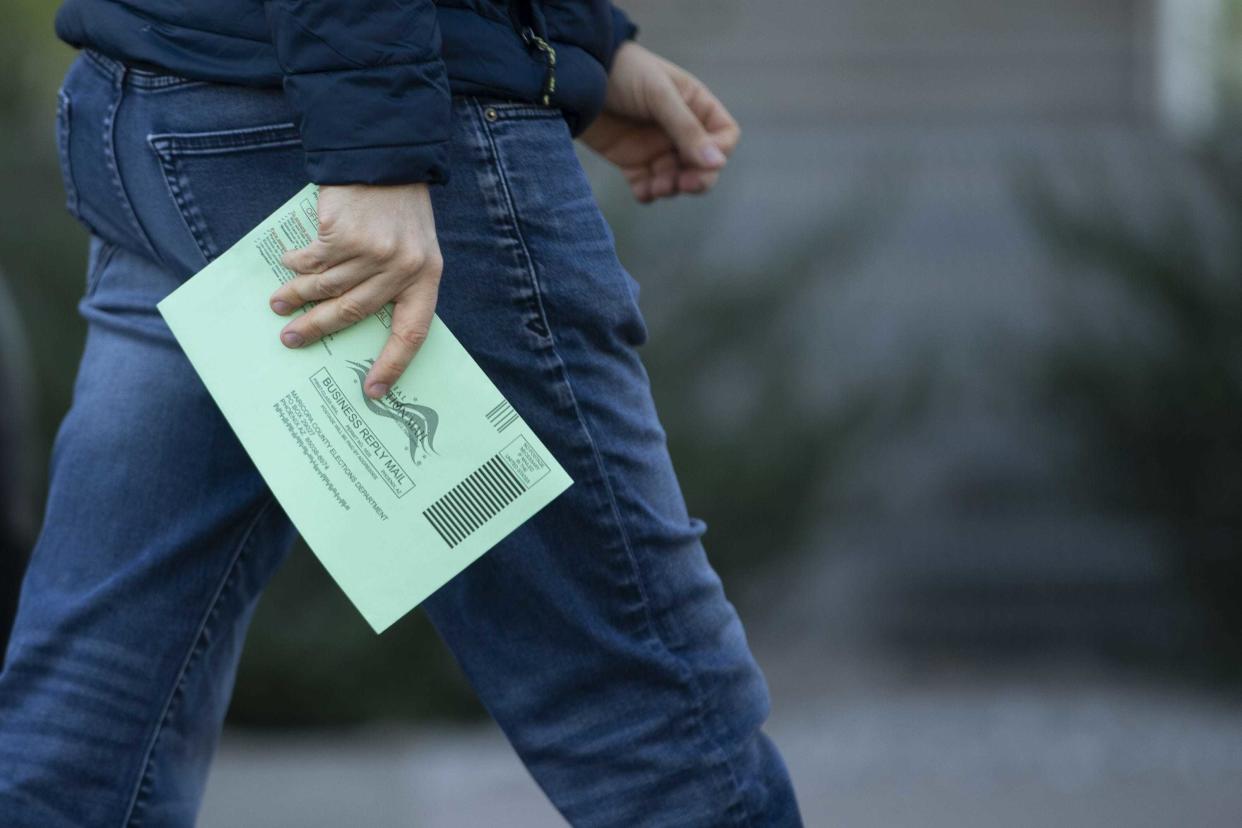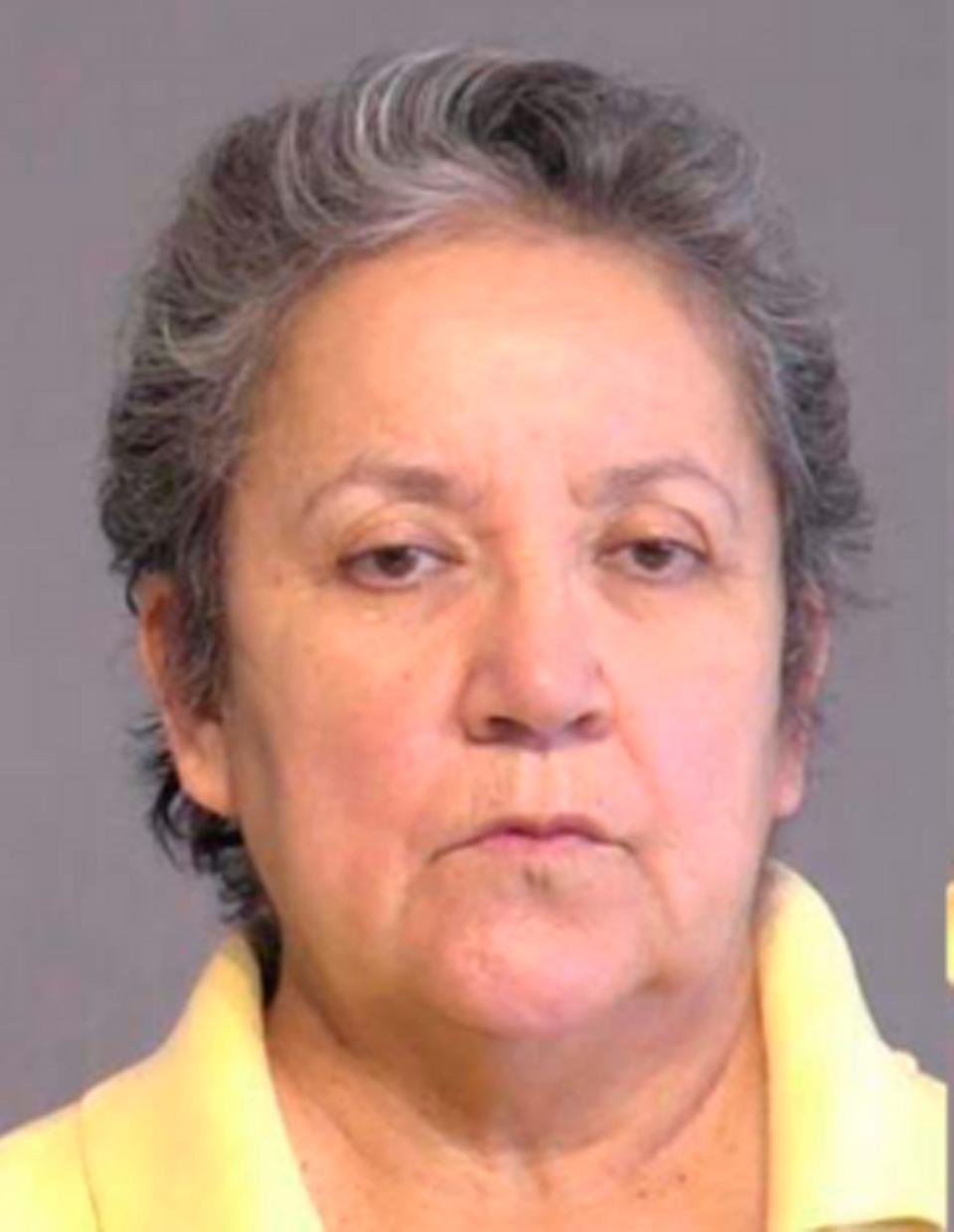What we know about San Luis, Arizona, election fraud case exploited by conspiracists

Guillermina Fuentes, a former San Luis mayor, pleaded guilty to ballot harvesting in a case that revolved around municipal races in the 2020 primary election.
Her crimes have been used misleadingly by election-conspiracy promoters.
Here's what we know.
What happened in this election in San Luis, Arizona?
Fuentes, who was also a Gadsden Elementary School District board member, pleaded guilty to ballot harvesting, a low-level felony, in July after an investigation of a case that revolved around municipal races in the southwestern Arizona town during the 2020 primary election.
Fuentes originally was charged with four felonies including conspiracy, ballot marking, forgery and ballot harvesting but negotiated a deal with prosecutors in which she pleaded guilty only to ballot harvesting.
Her neighbor Alma Juarez, who submitted four ballots at Fuentes' direction, pleaded guilty in March in the case.
How did the allegations come to light?

The undercover video of Gary Garcia Snyder, a Yuma Republican now running for the state Senate, launched the case against Fuentes and Juarez.
Snyder was running for the San Luis City Council in 2020 when he made a video of Fuentes at a park appearing to open a ballot envelope and write on the ballot. She sealed it with water from a water bottle before Juarez took it and the other ballots away. Fuentes later told an investigator she may have written the voter's name on the ballot and implied she might have made some selections.
Investigators gathered evidence that indicated the case was more extensive and involved more harvested ballots and potential election cheaters than just Fuentes and Juarez, state records show.
A local justice of the peace, Juan Guerrero, told an investigator that election “issues” had occurred in the small town for years, and that “influential people” like Fuentes were known as the “Chispas” and exchanged money for ballots.
Fuentes, interviewed on the same day as Guerrero, brought up the “Chispas” and said they were a group helping people register to vote, records state.
After discussing the plea agreement, records state, Fuentes agreed that she had committed ballot harvesting but didn't admit to any other allegations.
She denied strongly that she was a “criminal.”
“For so long I would help people with their right to vote,” Fuentes told prosecutors with an attorney present. “I am a people’s people. I understood farm workers and their struggles.”
What does the ballot harvesting law say?
Arizona’s 2016 anti-ballot-harvesting law, upheld by the U.S. Supreme Court last year, makes it a felony for voters to turn in the early ballots of other voters unless you are a family member, household member or caregiver. In some states, the practice remains legal.
What sentence are the women expected to receive?
Prosecutors have asked Yuma County Superior Court Judge Roger Nelson to give Fuentes a year behind bars for her role in the scheme, or at least ban her from ever again holding office if he sentences her to probation.
Nelson indicated in court paperwork he planned to sentence both women to 30 days in jail.
What about the claims in '2000 Mules'?
Makers of “2000 Mules,” a conspiracy-filled movie about Trump’s loss in the 2020 general election, relied on the San Luis case to help make unsupported claims that wide-scale, coordinated ballot harvesting had occurred in multiple states including Arizona.
The movie claims that cellphone records obtained by a Trump-supporting group, True the Vote, show the suspicious movement of hundreds of people — labeled by the group as "mules" — around ballot drop boxes. Records obtained from the state Attorney General’s Office show that officials attempted repeatedly to obtain the cellphone data from True the Vote, but the group never followed through on its offer to share it.
True the Vote didn't replay to a message from The Republic on Sept. 1 seeking comment.
The group’s claims remain unsubstantiated. Yet Trump supporters, including Republican gubernatorial candidate Kari Lake, spread the false idea that the Fuentes case was tied to the alleged findings in the movie.
“These Mules got CAUGHT,” Lake said in a June 27 tweet. “Let this serve as a WARNING to any future Mules. #2000Mules.”
Lake’s tweet also promoted Snyder's campaign.
What is the status of the case?
The case remains in the sentencing phase.
Nelson earlier had denied a motion to delay Fuentes' scheduled Sept. 1 hearing, which was to include both a mitigation and sentencing hearing.
Fuentes' attorney Andy Gaona argued in an Aug. 22 appeal that if the hearing weren’t delayed, Fuentes would be denied two key witnesses who would testify that Fuentes deserved probation.
Additionally, she would have been denied representation by one of her attorneys, who would have been out of town, Gaona wrote.
How does the case affect state politics?
The attorney's absence would have hurt Fuentes’ mitigation arguments, as she was facing a “toxic” political environment driven by “an emboldened prosecutor who sought an aggressive and unprecedented sentence in the middle of his flailing political campaign,” Gaona wrote in the appeal.
His remarks referred to state Attorney General Mark Brnovich, who has been criticized by liberals for pandering to election conspiracy believers and by the believers who say he failed to aggressively investigate election crimes after Trump's loss.
Brnovich lost in the Aug. 2 Republican primary election for U.S. Senate to Blake Masters, who will now face Sen. Mark Kelly in November’s election.
Gaona accused the Yuma County Sheriff’s Office of political shenanigans, saying the office put out a news release on other Yuma-area election-related investigations to coincide with the promotion of the conspiracy movie. The movie's release, in turn, "coincided closely" with a court email suggesting the two women would receive a 30-day jail sentence, Gaona wrote.
He described the ballot harvesting law as an unneeded policy passed during Democrats' efforts to register voters in minority communities that would be negatively affected by the law.
The Arizona Court of Appeals turned down Fuentes' appeal for the delay.
What is the next step before sentencing?
On Sept. 1, Nelson approved a continuance in the case because of a death in the family of one of Fuentes' attorneys.
Nelson set a mitigation hearing for 2 p.m. Oct. 6, with a sentencing hearing to be set after that.
Because Juarez’s sentencing is tied to Fuentes’ case, her sentencing was moved as well.
Reach the reporter at rstern@arizonarepublic.com or 480-276-3237. Follow him on Twitter @raystern.
Subscribe to azcentral.com today.
This article originally appeared on Arizona Republic: San Luis, Arizona, ballot harvesting case exploited by conspiracists

